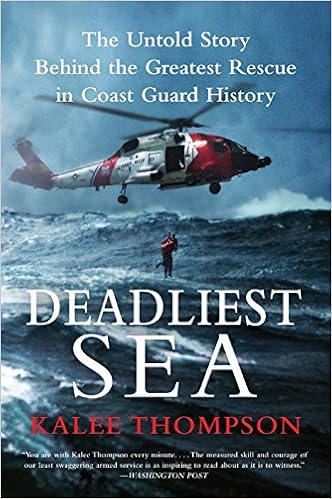 It was after 2 a.m. when the fishing trawler Alaska Ranger started taking on water.
It was after 2 a.m. when the fishing trawler Alaska Ranger started taking on water."Mayday! Mayday! Mayday! This is the Alaska Ranger," First Mate David Silveira said in a call to the Coast Guard.
Less than three hours later, the Alaska Ranger would sink beneath the waves of the Bering Sea, north of the Aleutian Islands, leaving 47 people to fight for their lives. Some made it into lifeboats, but most were cast adrift individually, floating in the darkness in special "gumby" survival suits.
"Deadliest Sea" is an outstanding account of the sinking and the incredible rescue efforts involving two Coast Guard helicopters, a Coast Guard ship and another fishing vessel. In the end, 42 of the 47 people were saved.
Author Kalee Thompson pulls together a 360-degree look at the sinking and rescue, offering multiple perspectives from the fisherman and the Coast Guard crew and rescuers. She fills the book with so much good detail you can practically feel the spray of cold sea water splashing on you face.
In one way, you might say the story lacks suspense. The cover of the book describes it as "the greatest rescue in Coast Guard history," so you know that things are going to end up mostly OK.
Still, it's the way they do it that's fascinating. This is primarily a story about Coast Guard heroes. Thompson brings us inside the rescue operations to learn how training, discipline and determination helped the Coast Guard to rescue so many people in turbulent seas in the dark of night.
Thompson, for example, notes the precise terminology used inside a Coast Guard helicopter.
"From the safety checklists that the crew collectively runs through every time the swimmer leaves the cabin, to the 'conning' -- or positioning -- commands that keep the helo safely in place over the breaking swells, the crew are speaking a custom-made language built on succinct, declarative sentences. In the middle of the night, in the Bering Sea, for even one member of a four-man helicopter crew to be confused about what's happening is to put the entire crew in danger."
Thompson also delves into the commercial fishing industry, documenting its disturbing history of inattention to safety.
One thing that would have made the book better: A list of characters, to use as a reference, in the front or back. There's a lot of people in this book and sometimes it's hard to keep them straight.
If you like this sort of book, you will also like "Fatal Forecast," a gripping page-turner about New England fishermen fighting for their lives amid a severe storm.
---
(Please support this blog by clicking on an ad, or by donating via the Paypal button below.)
No comments:
Post a Comment